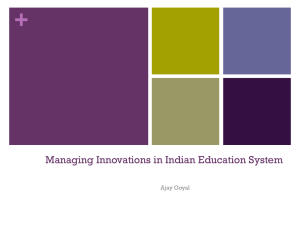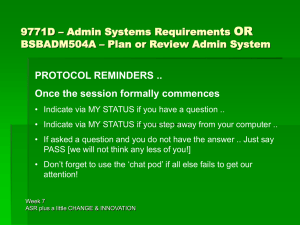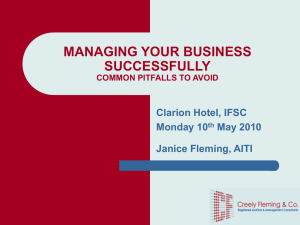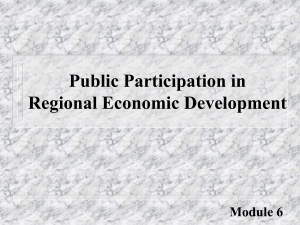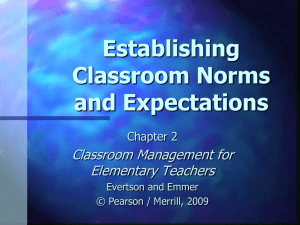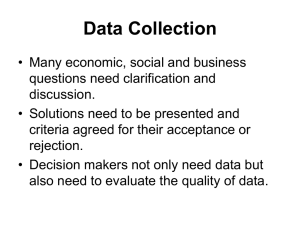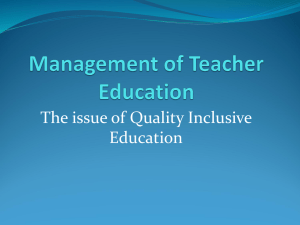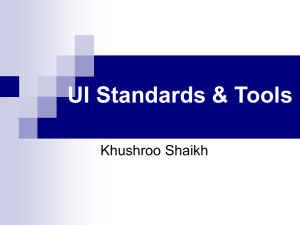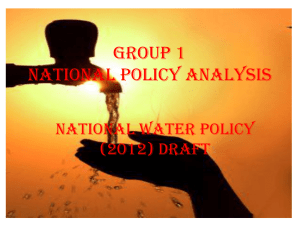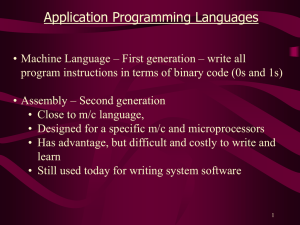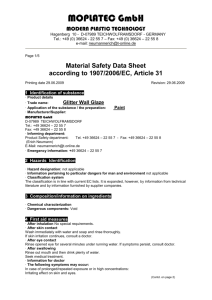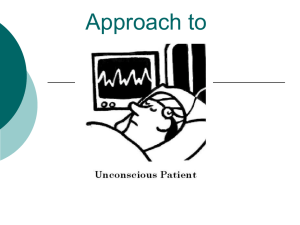A Paper Presented by Moses Ogunleye fnitp President, ATOPCON
advertisement
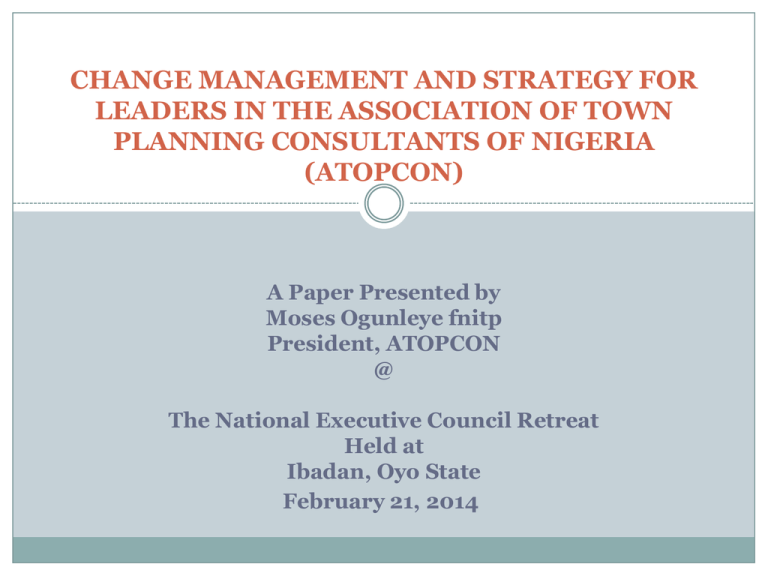
CHANGE MANAGEMENT AND STRATEGY FOR LEADERS IN THE ASSOCIATION OF TOWN PLANNING CONSULTANTS OF NIGERIA (ATOPCON) A Paper Presented by Moses Ogunleye fnitp President, ATOPCON @ The National Executive Council Retreat Held at Ibadan, Oyo State February 21, 2014 THE OBJECTIVES OF THE PRESENTATION To re-emphasize the certainty of change. To highlights systems dynamics and relate same to operations of ATOPCON and Consultancy Practice. To highlights management functions as it applies to managing professional body like ATOPCON. To improve the management skills of ATOPCON officers. THE NECESSITY OF CHANGE A change is a certainty. It must take place always. Indeed, its when change takes place that “value is added”. The change could be in a system (social, technology, etc) behavioural (human beings, other creatures). Change sometimes bring fears, loses, treats, anxiety and low moments. Conversely it could bring intangibles like freedom, joy, victory, and tangibles like increased profit, membership development etc. The Necessity of Change…….. contd For every change that occurs, an action or individual is responsible. For a change to be positive its process must be well understood, while someone must take responsibility for the change. A change that has been “scheduled” or deliberate is likely to be better managed than an emergent (reactionary) one. The Necessity of Change…….. contd However every change must have a value and must be sustainable. “There is little point in making change that has value if it does not stick. This is the root problem with so many change programmes” Mick Cope. We often times have spend a lot of resources in making worthwhile changes with resounding success only to discover that only the value added remains little after sometime. Why do this happens in many organisations? SYSTEMS DYNAMICS What is a system? A group of things, pieces of equipment etc, that are connected or work together. E.g a computer system, transport system. It also means a particular way of doing things or in which things function. E.g a Presidential system of government. One of the characteristics of a system is that it is amenable to change. Thus, a change will led to other changes, hence dynamics. Systems Dynamics…….. contd A system functions interdependent of another, hence it remain a sub-system in the larger system – INTEGRATION. Our ATOPCON remains a system. (The National, the State Branches, the Firms). At larger system level, ATOPCON will be a subsystem. (Within the system of TOWN PLANNING Family – NITP, TOPREC. Systems Dynamics…….. contd In order to appreciate how a system works or its level of efficiency, the system need to be considered / defined using the following Identify the objectives, constraints / opportunities of the system State all possible approaches to limiting constraints / enhancing opportunities Make trade off Do a synthesis Systems Dynamics…….. contd APPLYING SYSTEMS APPROACH TO ATOPCON What are the objectives of the National Body / State Branches What strategies have been used in achieving the objectives Which is the better strategy, considering all facts. UNDERSTANDING STRATEGIC MANAGEMENT The Nature Strategic Management Involves a major decision that determines (a precursor to) many other activities. Usually such decision leads to choosing a new course of action or rejuvenating an existing one. Considers the implications of actions on all matters related to management function. Understanding Strategic Management.. contd It differs from mere business considerations: why? Deals with concerns which are central to the survival of entire organisation e.g for ATOPCON – change in the Constitution, Membership Criteria, etc. Addresses issues that are unusual to the organisation (Non-routine issues) Affects the way low level decisions in the organisation are made. The Strategic Management Process (as adopted to ATOPCON Scenario) INPUT 1 Strategy Formulation Members Needs Resources (e.g Money, People, time, Information) 2 Strategy Implementation 3 Strategy Evaluation & Control OUTPUT Satisfaction Job Opportunities Influence in governmental and professional cycles MANAGING SYSTEMS AND CHANGE There is the critical need to note that all systems operate with an environment. No environment is static, continuous process of function, hence “oceanic” change. What are the characteristics of an environment Complexity, Dynamism, Multi-facets far reaching impacts. Managing Systems And Change…. contd External System Environment •Social •Physical •Economic •Technology •Regulatory •Others Internal System Environment •System Resources •Behaviour •Strength & Weakness Managing Systems and Change…… contd The degree of understanding of the characteristics of the environment where one operates goes a long way to determine the ability to manage the change therefrom. To what extent do you understand your setting – external and internal? Should issues like happennings in Political Parties, the Nigerian Banking System, the Nigerian Football Federation, NAFDAC be of any particular interest to us? MANAGEMENT FUNCTIONS Preamble Leaders or Officers in ATOPCON should measure their success by how well they meet the aspirations of members and the corporate goal(s) of the Association. In whatever level one operates, the early management responsibilities and skills identified by practitioners are key for leaders. Planning Organizing Staffing Controlling directing Management Functions….. contd Which of the five is most important? In which of them should a practitioner in Town Planning place emphasis in order to operate efficiently and effectively? All the five are very important, they are inextricably linked. A consultant strength must be in all CASE STUDY – THE “X” AND “Y” THEORIES THEORY X A manager that accepts theory X normally exercise authoritarian type of control over workers, allows little participation in decision making. Employees generally favour lack of responsibility, particularly in decision making. Case Study – The “X” and “Y” Theory… contd THEORY Y Employees are willing to get the job done without constant supervision. Assumes average workers want to be active and find the physical and mental effort on the job satisfying. Assumes average worker seeks opportunity for personal improvement and self respect. KNOWLEDGE AS CAPITAL A critical resource required by leaders and consultants is the knowledge / talent. Indeed, talent has been described as the only real capital base. But then, how does the Consultant measure, market and manage this intangible capital base. There is the dilemma of “time costing” in “talent selling”. Remember how relieved client can be when his job is concluded within time budget. Knowledge as Capital…… contd Relate this to the Client’s reaction when the task is carried out within a short time and he raised the puzzle of why he should pay the amount for the work carried out within “so short” a time. Our strength is in our knowledge and expertise, which can be applied all through “Knowledge management is crucial because what worked yesterday may not work tomorrow” How rich is your knowledge capital / or what is the value of your knowledge capital? Knowledge as Capital…… contd We can enhance our knowledge capital in many ways: Time Management Information Technology Negotiation Strategies Cost / Financial Management Decision Making Tools Relationship Management Communication Management How current is your knowledge in all these. MODERN MAN’S EIGHT DISEASES (INCLUDING LEADERS MAYBE SOME CONSULTANTS Wealth without work Pleasure without conscience Knowledge without character Commerce without morality Science without humility Worship without sacrifice Politics without principles • MAHATMA GANDHI Rights without responsibilities • MOSES OGUNLEYE CONCLUSION We can help our organization / client to move from a world that they know and shift them into the area of unpredictability and uncertainty. We can ensure that ideas are really pushed to their limits to understand what value they might add. Conclusion…… contd See very well and assist others see the big picture. The decision to adopt a particular change in style is not black and white. Smarter consultants will help build smarter organizations.
